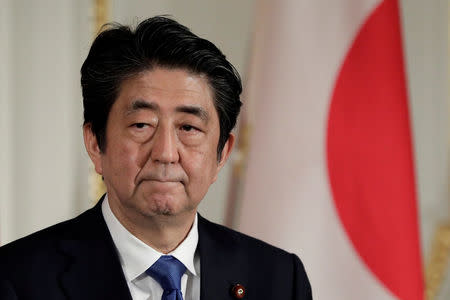Japan's first-quarter GDP growth seen slowing sharply in setback for 'Abenomics'
By Tetsushi Kajimoto
TOKYO (Reuters) - Japan's economy likely slowed to a crawl, or possibly even contracted slightly at the start of this year, which would break the longest run of growth seen for decades and thwart Prime Minister Shinzo Abe's reflationary 'Abenomics' polices.
Many economists expect the world's third largest economy will return to growth in the current quarter, while blaming temporary factors such as bad weather and a slowdown in global electronic products demand for the first-quarter slump.
But potential fallout from Sino-U.S. trade frictions and global protectionism cloud the outlook for Japan's export-reliant economy in the coming quarters, they say.
"The economy maintains momentum towards recovery but exports are slowing as global growth seems to have peaked in the fourth quarter," said Ryutaro Kono, chief economist at BNP Paribas Securities.
"Manufacturers are piling up inventories of goods and the United States is leaning towards protectionism, so Japan's economy may struggle to accelerate in the second quarter onwards."
Policymakers worry that next year's planned sales tax hike could hurt fragile domestic demand as sluggish wages keep a lid on consumer spending, despite the record profits earned by Japanese corporations.
A sharp slowdown could also add to the headaches of a premier grappling with domestic issues such as suspected favouritism, declining support, and opposition pressure for his finance minister to resign.
A slowdown could also call the Bank of Japan's rosy economic outlook into question, especially after the central bank last month ditched a firm timeframe for meeting its elusive 2 percent inflation goal after more than five years of monetary stimulus.
All this could mean that the government will keep the fiscal spigot wide open and maintain pressure on the central bank to prolong its massive monetary stimulus, some economists say.
Cabinet Office data due on Wednesday is expected to show Japan's economy contracted at an annualised rate of 0.2 percent in January-March from the previous quarter, slowing sharply from 1.6 percent annual growth seen in October-December 2017.
A contraction would mark the first decline in gross domestic product (GDP) in nine quarters, ending the longest run of growth since a 12-quarter streak from April-June 1986 to January-March 1989 during Japan's economic bubble.
A 0.2 percent contraction would translate into a flat quarter-on-quarter reading, a Reuters poll of 18 economists found.
Private consumption, which makes up about 60 percent of the economy, probably stood flat after a 0.5 percent gain in the fourth quarter.
The quarter was hit by bad weather that drove up fresh vegetable prices and dampened consumer spending.
External demand - or exports minus imports - likely made no contribution to first-quarter GDP as exports slowed from the rapid growth seen in the second half of 2017, led by strong exports of electronics and electrical sectors products related to smartphones.
Capital expenditure likely rose 0.4 percent, versus a 1 percent gain in the previous quarter, led by demand for factory automation and labour-saving technologies as companies tried to cope with a labour shortage.
(Reporting by Tetsushi Kajimoto; Editing by Eric Meijer)

 Yahoo Finance
Yahoo Finance 

